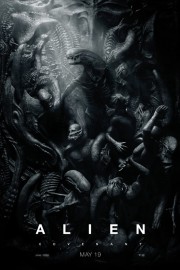Alien: Covenant
The fact that this is now the sixth movie in the “Alien” franchise, including 2012’s “Prometheus” (and NOT including the “Alien vs. Predator” films) is almost as unreal as there being eight “Fast and the Furious” movies- seriously, how far can this franchise go? Evidently, Ridley Scott has ideas for one more film, to complete the trilogy begun with “Prometheus” that will take the franchise full circle to his 1979 original, but seriously, it’s hard to know what to make of that. To think that many people considered this series dead after 1997’s underrated “Alien Resurrection.” Who could have imagined that, 20 years later, we’d be in the middle of a new trilogy? It’s a testament to Scott’s intrigue in the world, as well as Fox’s desire to milk a franchise for all its worth.
We begin with a sterile, white room, wherein Peter Weyland (Guy Pearce), the head of the Weyland Corporation, which has been central to the “Alien” franchise since that 1979 film, is giving David (Michael Fassbender), the synthetic from “Prometheus” an education in where he came from, what his capabilities are, and his purpose. We then cut to a spaceship, the Covenant, heading to its destination in the stars. The Covenant is a taking colonists to a far away world to be terraformed for human habitation. The humans are in cryogenic sleep while a lone synthetic, Walter (also played by Fassbender), keeps up with the tasks of the ship. As he puts out panels for a solar charge, the ship passes through an energy wave that causes disruptions in the sleep cycle, with some people dying, including the captain of the Covenant. The crew (including Billy Crudup, Katherine Waterston, Danny McBride and Demián Bichir) plots out a course when, during repairs, they come across a seeming distress signal coming from a nearby world that would appear habitable for human life, bringing up the question of why it was not an option for their mission. They send a party to investigate, and sure enough, well, you know probably what happens.
More so than he did in “Prometheus,” which focused on larger questions of discovery than killer alien shenanigans, Scott and his screenwriters, John Logan and Dante Harper, are borrowing quite a bit the original “Alien” in their approach to this film, and while it works by and large, a fresh approach to the material would have been nice to see. In the last half hour, in particular, the film really dives deeply into Scott’s “Alien” playbook, almost in a shot-for-shot manner, at times, and it deflates what was an otherwise compelling entry in the series. The second act of the film pays off the ending of “Prometheus” in ways that brought up issues of humanity’s place in the cosmos and get closer to the truth about how the alien species in this franchise, which appeared in its infancy in “Prometheus,” continues to evolve into what we first saw in “Alien” back in ’79. Scott and his writers put a compelling bow on that mystery in this film that makes sense in the larger narrative, but also makes one wonder what is left to be said in this franchise moving forward for Scott as he explores the pre-“Alien” world. I wasn’t as big a hater of “Prometheus” as others were, although my feelings on it diminished after watching it again, and realizing just how little interest in the characters I had except for David. I feel like the larger narrative, and the startling imagery Scott and cinematographer Dariusz Wolski put on screen, are what matter most to Scott with these films, and even if it does fizzle out in the end, he has a confidence in his vision, and his affection for this universe is palpable. He just better stick the landing the next time out, if another film does happen.










